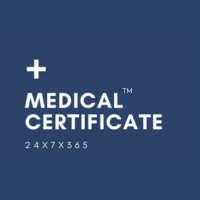Letters aren’t pieces of paper: medical certificates are official documents that indicate someone’s health condition. It is used to cover a day off from work, fulfill a legal obligation, or submit an insurance claim; they bear the great responsibility of establishing a link between illnesses and responsibility.
But here’s the thing: Most people have a poor perception of what medical certificates are all about, especially how they are issued and provided. Such misconceptions are a nightmare for the employees and the employers of the organisation to the same extent. In this post we will help people to clear some misunderstandings about medical certifications and tell you how to do it correctly.
What Exactly Is a Medical Certificate, and Why Do You Need It?
In simple terms, a medical certificate is a document issued by a licensed doctor that confirms your health condition. It typically includes:
- A diagnosis.
- Recommendations for rest or treatment.
- How long you might need to recover or be excused from work.
When Are Medical Certificates Needed?
Here are a few common reasons you might need one:
- Workplace Leave: To explain why you missed work due to illness or injury.
- Legal Requirements: For things like applying for a driver’s license or special accommodations.
- Insurance Claims: To back up a claim for medical or health-related expenses.
While these uses seem pretty straightforward, there are still a lot of misunderstandings about medical certificates that make things unnecessarily complicated.
Busting 5 Common Myths About Medical Certificates
Myth 1: Any Doctor Can Issue a Medical Certificate
The Reality: Only licensed and registered medical practitioners can issue valid medical certificates.
If someone unlicensed writes you a certificate, it’s not just invalid—it’s illegal. Employers and authorities usually verify the credentials of the doctor to ensure the certificate is legit.
Myth 2: A Medical Certificate Automatically Approves Your Leave
The Reality: A medical certificate supports your request for leave, but it doesn’t guarantee approval.
However, they cannot make the decisions for you as you are professionally answerable to your employer in accordance with your company’s policies, workloads, etc. It is something that supports your argument and therefore when the decision is made you are not left with nothing.
Myth 3: Medical Certificates Applies Only to Chronic Diseases
The Reality: They’re for temporary or chronic illnesses.
In fact, even if you have a slight sickness such as cold, fever or even a minor injury that prevents you from working, you can be issued with a medical certificate. , specifically, for acute conditions that may only be for a short time, adequate documentation might not apply but chronic conditions such as surgery recuperation or enduring diseases may call for detailed documentation.
Myth 4: It Takes Ages to Get A Medical Certificate
The Reality: Modern technology has made the process faster than in the past than anyone can think of.
Already replaced by something new as waiting hours in the doctor’s office. Today, there are sites such as MedicalCertificate.in where you can talk with qualified physicians and receive a certificate remotely in several hours.
Myth 5: Employers Don’t Verify Medical Certificates
The Reality: Many employers actively check the validity of medical certificates.
HR departments often contact the doctor or verify their medical council registration number. Submitting a fake certificate could result in serious consequences—termination, legal trouble, and a damaged reputation.
How to Get a Medical Certificate for Work
Need a medical certificate? Here’s how to do it right:
Step 1: Pick a Trusted Platform
Choose a reputable service, like MedicalCertificate.in, to ensure your certificate meets all the necessary regulations.
Step 2: Fill Out an Online Form
You’ll need to provide:
- Any information concerning your signs and past history.
- Your current health status and your current medications if any.
- The details you have to provide include its purpose (for example, when you ask for sick leave or to confirm legal requirements).
Step 3: Schedule a Virtual Consultation
- Book a video or phone appointment with a licensed doctor. During the consultation:
- Discuss your symptoms honestly.
- Answer the doctor’s questions so they can assess your condition.
Step 4: Receive Your Certificate
If the doctor determines you need one, they’ll issue a digitally signed medical certificate. It’ll include:
- Your diagnosis and any recommended treatment or rest.
- The doctor’s credentials and registration details.
Step 5: Submit the Certificate
Download the certificate and share it with your employer, insurance provider, or anyone else who needs it.
Why Use Online Platforms for Medical Certificates?
Online services make getting a medical certificate simpler and faster. Here’s why:
1. Convenience: You can handle the entire process from home—no need to visit a clinic.
2. Speed: Many online platforms issue certificates the same day.
3. Privacy: Digital consultations are secure and confidential.
4. Accessibility: Great for people in remote areas or with mobility issues.
Tips for Addressing Employer Concerns
Sometimes employers have doubts about medical certificates. Here’s how you can ease their concerns:
Provide Complete Documentation: Make sure your certificate includes all the key details—like the doctor’s registration number, your diagnosis, and recommended treatment.
Be Transparent: Talk openly with your employer about your situation to build trust.
Choose Reputable Services: Getting a certificate from a trusted platform reduces the risk of disputes.
Final Thoughts
Medical certificates are important tools—they help validate health related absences and keep everything above board. But misunderstandings about how they work often make things harder than they need to be.
It is not that challenging to make it easy for all the parties involved when you have the facts and follow proper procedures when planning to do it through a trustworthy online service like MedicalCertificate.in.
And as always, it is important to be truthful. A legal medical certificate not only fulfills your requirement but also serves your identity.

